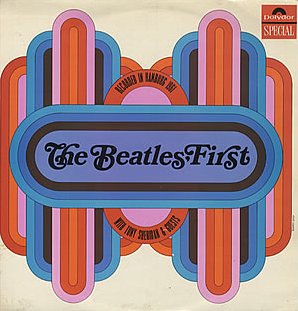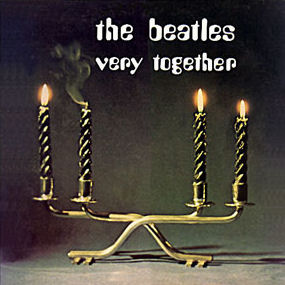
Bert Kaempfert was a German orchestra leader, multi-instrumentalist, music producer, arranger, and composer. He made easy listening and jazz-oriented records and wrote the music for a number of well-known songs, including "Strangers in the Night", “Danke Schoen” and "Moon Over Naples".
ATCO Records is an American record label founded in 1955. It is owned by Warner Music Group and operates as an imprint of Atlantic Records. After several decades of dormancy and infrequent activity under alternating Warner Music labels, the company was relaunched by Atlantic Records in early 2020.
"My Bonnie Lies over the Ocean", or simply "My Bonnie", is a traditional Scottish folk song and children’s song that is popular in Western culture. It is listed in Roud Folk Song Index as No. 1422. The song has been recorded by numerous artists since the beginning of the 20th century, and many parody versions also exist.

Anthony Esmond Sheridan McGinnity, known professionally as Tony Sheridan, was an English rock and roll guitarist who spent much of his adult life in Germany. He was best known as an early collaborator of the Beatles, one of two non-Beatles to receive label performance credit on a record with the group, and the only non-Beatle to appear as lead singer on a Beatles recording which charted as a single.

My Bonnie is a 1962 album by English rock and roll singer-songwriter and musician Tony Sheridan. Sheridan, then playing in clubs in Hamburg with the Beatles, was discovered by producer Bert Kaempfert and subsequently signed with him to record for Polydor. Sheridan recorded several songs with the Beatles, of which only a single was released in 1961, the titular "My Bonnie" and B-side "The Saints", credited to Tony Sheridan and the Beat Brothers. While both songs are included here, the remaining tracks on this album were credited again to the Beat Brothers but recorded without the Beatles.

Daniel Joseph Anthony Meehan was a founder member of the British group the Drifters with Jet Harris, Hank Marvin and Bruce Welch, which evolved into the Shadows. He played drums on early Cliff Richard and the Shadows hits and on early Shadows' instrumentals.

"Cry for a Shadow" is an instrumental rock piece recorded by the Beatles on 22 June 1961. They recorded the song at Friedrich-Ebert-Halle within the gymnasium, Hamburg, West Germany while they were performing as Tony Sheridan's backing band for a few tracks, under the moniker the Beat Brothers. It was written by George Harrison with John Lennon, as a pastiche of the Shadows' style. It is the only Beatles track to be credited to Lennon and Harrison alone.

The Early Tapes of The Beatles is the first digital repackaging of The Beatles' First !, the 1964 German compilation album of Tony Sheridan and The Beatles recordings. The songs were recorded in Hamburg between 1961 and 1963. Most of the tracks feature vocals by Sheridan. Only tracks 1-5, 7, 10, and 11 actually feature the Beatles, with John Lennon singing lead on "Ain't She Sweet" and featuring "Cry for a Shadow", an instrumental written and performed by the British group alone. The other songs are performed by Sheridan and other musicians, identified as "The Beat Brothers". This CD, which was released in 1984, includes two additional tracks and an extended version of "Ya Ya" and was reissued in 2004 with a different design on Universal Music's Spectrum label.

In the Beginning is the first American packaging of the 1964 German album by Tony Sheridan and the Beatles, called "The Beatles' First!".

Ain't She Sweet was an American compilation album featuring four tracks recorded in Hamburg by The Beatles in 1961 and 1962. Cover versions of Beatles and British Invasion-era songs recorded by the Swallows complete the tracklist.

The Beatles with Tony Sheridan and Their Guests was an American compilation album that included "Cry for a Shadow", an instrumental written and recorded by The Beatles, plus three other recordings with the fledgling group backing fellow British guitarist and vocalist Tony Sheridan.

The Beatles' First! is a German compilation album of songs recorded in Hamburg in 1961 and 1962 by Tony Sheridan with the Beatles as his backing group. It was originally released in 1964 in Germany, then issued in 1967 in England, 1969 in Canada and finally in the United States in 1970.

"Ain't She Sweet" is a song composed by Milton Ager, with lyrics by Jack Yellen. It was published in 1927 by Ager, Yellen & Bornstein, Inc. It became popular in the first half of the 20th century and typified the Roaring Twenties. Like "Happy Days Are Here Again" (1929), it became a Tin Pan Alley standard. Both Ager and Yellen were elected to the Songwriters Hall of Fame.

Very Together is an album by the English rock band the Beatles and the first compilation of the band's early recordings supporting Tony Sheridan to be released in Canada. It was issued in November 1969 by Polydor Records, with the catalogue number 242.008. The cover photograph features four candles, one of which has been extinguished – a reference to the "Paul is dead" urban legend.
The recordings made by the Beatles, a rock group from Liverpool, England, from their inception as the Quarrymen in 1957 to their break-up in 1970 and the reunion of their surviving members in the mid-1990s, have huge cultural and historical value. The studio session tapes are kept at Abbey Road Studios, formerly known as "EMI Recording Studios," where the Beatles recorded most of their music. While most have never been officially released, their outtakes and demos are seen by fans as collectables, and some of the recordings have appeared on countless bootlegs. The only outtakes and demos to be officially released were on The Beatles Anthology series and its tie-in singles and anniversary editions of their studio albums. Bits of some previously unreleased studio recordings were used in The Beatles: Rock Band video game as ambient noise and to give songs studio-sounding beginnings and endings. In 2013, Apple Records released the album The Beatles Bootleg Recordings 1963, which includes previously unreleased outtakes and demos from 1963, to stop the recordings from falling into the public domain.
"Don't Forbid Me" is a popular song by Charles Singleton. Among Singleton's huge number of compositions was "Tryin' to Get to You", which had previously been recorded by Elvis Presley at Sun Records. In 1957, "Don't Forbid Me" was a number 1 hit for Pat Boone, and also peaked at number 10 on the Most Played R&B in Juke Boxes chart.

"Ya Ya" is a song by Lee Dorsey. The song was written by Dorsey, C. L. Blast, Bobby Robinson, and Morris Levy. Levy's participation in the writing has been called into question; the Flashback release of the single lists only Dorsey and Blast as writers, as do the liner notes to the American Graffiti soundtrack.
"Nobody's Child" is a song written by Cy Coben and Mel Foree and first recorded by Hank Snow in 1949. Many other versions of this song exist.

Sugar and Spice is the second studio album by the British rock band The Searchers released in 1963. This album features the band's second big hit single "Sugar and Spice". With two successful Top 5 albums in three months, and two other Top 3 hit singles at the time, the group proved to be the strongest to emerge from Liverpool next to the Beatles and Gerry and the Pacemakers. They solidified their position further with another album track, "Ain't That Just Like Me", which was later released in the US and hit #61 on the Billboard Hot 100.

"Skinny Minnie" is a 1958 song co-written and recorded by Bill Haley and his Comets. The song was released as a Decca single which became a Top 40 chart hit in the U.S., peaking at #22 on the Billboard chart.















